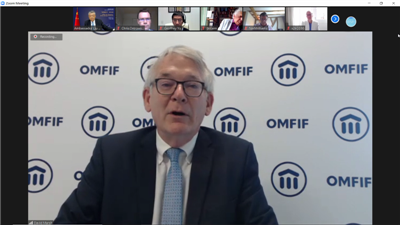Ambassador Liu Xiaoming Delivers A Keynote Speech and Answers Questions at the Webinar with UK Think Tanks On China-Europe Relations


David Marsh from OMFIF: Thank you, Mr. Ambassador. It seems that you've missed an opportunity to bring Europe together on China's side, and to promote a kind of distance with the United States. Why haven't you taken that opportunity?
Ambassador Liu: I think there's a lot of misunderstanding of China's position. We do not try to drive a wedge between the United States and Europe. I know they are allies, and we just want to be friends with everybody. We want to have good relations with the United States. I've been posted twice in Washington DC. Half of my 45 years of diplomatic career was dedicated to China-US relations. We want to have good relations with the United States. We always believe that there will be no world peace or prosperity without a sound, stable relationship between China and the United States, but this relationship has to be based on mutual trust and equality. You need two to tango and you need two hands to clap. So we want to have a good relationship featuring no conflict, no confrontation, mutual respect and win-win cooperation based on coordination, cooperation and stability, and we are working for that.
On China-Europe relations, as I said in my presentation, which I don't need to repeat them, we want to see Europe and EU as partners of China, not rivals. We see each other as opportunities, and I am very pleased that we are the second largest trading partners of each other. And there is enormous common ground, common interests to tie our two sides together.
David Marsh: Could I just ask one simple question please, which relates to the UK but may also have some bearing on the European countries, which is the question of telecommunications. We've had the decision yesterday by the British government that we won't go ahead with Huawei in the UK, even though we know what that company has done on 5G network within a few years, and it will be bringing costs to the UK. What do you think will be the concrete results in terms of China-UK collaboration from that decision, which was announced yesterday?
Ambassador Liu: I think it first of all undermined the trust between the two countries. You know, mutual trust and mutual respect are really the basis for a relationship, not only between individuals but also between two countries. Yesterday I tweeted, "Disappointing and wrong decision by the UK on Huawei". I would even say it's not only disappointing, it's disheartening. You know, when you see this company, it's a good company. They've been here for 20 years. They not only invested 3 billion pounds in this country but also created 26,000 jobs, paid the tax and contributed greatly to the telecom industry of this country and to the local community. What they have done for this country is described by British media and some politicians as "hurt the country". It's very disheartening. The way you treat Huawei will be followed very closely by other Chinese businesses. When the mutual trust was undermined, it'll be difficult for the businesses to have more investment here.
So you don't need government to say anything. I think the businesses can come to their own conclusions. So I think the trust is seriously damaged between the countries and between the governments and the businesses.
David Marsh: Will the Golden Era between Britain and China be upheld or become somewhat more tarnished?
Ambassador Liu: The Golden Era really needs the two sides to make efforts. The Golden Era was proposed by the UK side. When President Xi Jinping was here in 2015, the UK leader proposed that we should build the Golden Era. We think this Golden Era is a reflection of the level of China-UK relationship. It is in the interest of the two countries. So we embraced this idea, we endorsed it and we agreed to this idea. So we work together to build this Golden Era. This is the fifth year of the Golden Era. I thought we could celebrate the fifth anniversary of the Golden Era. But, you know, so many things happened. It's not because of China.































